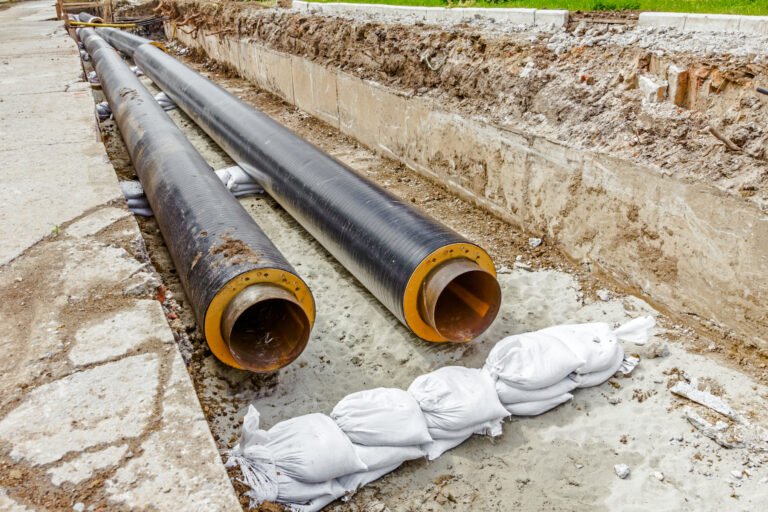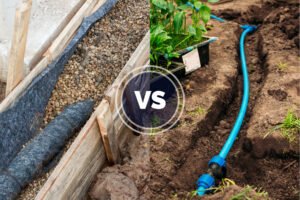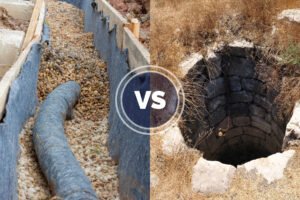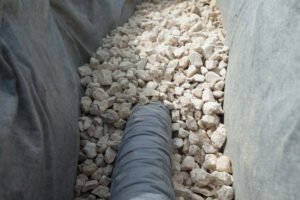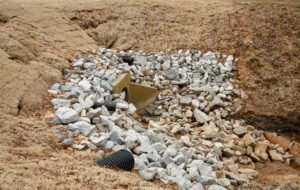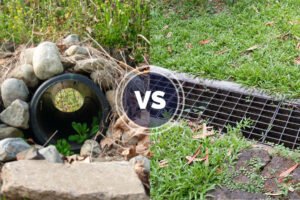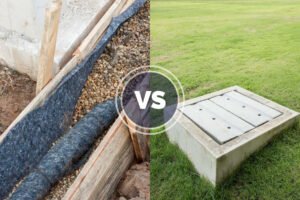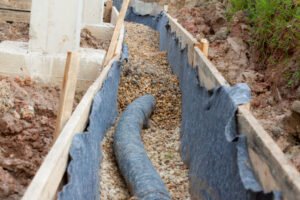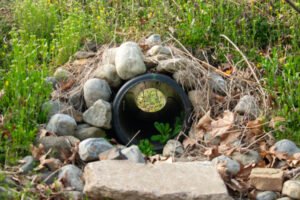French drains are foolproof tools to prevent surface water runoff and damage. But, do you know that the wrong drain pipe might reduce its water flow and backflow the excess water to the house? Additionally, it might clog due to silt and sediment, leak, break and add to your troubles.
So, all you need is a sturdy french drain pipe that matches the slope, depth, and width of your trench. But which is the best pipe to use for a french drain? Since these pipes come with different properties, it might be handy to check their pros and cons for efficient drainage. So, let’s have a look!
A smoother but perforated, 8-12 inch PVC or corrugated pipe is the best pipe for the french drain as it has some grooves and holes that prevent standing water and add stability. But avoid using steel or plastic pipes as they might corrode, rust, or break easily.
Which Are Some of the Popular French Drain Pipes?
You can use any PVC, corrugated or perforated pipe in your french drain installation. But since each of these pipes has different durability, draining speed, and strength, it’s better to analyze the specifications, costs, and sizes before purchase. And we have listed them down below for your convenience.
1. PVC Pipe
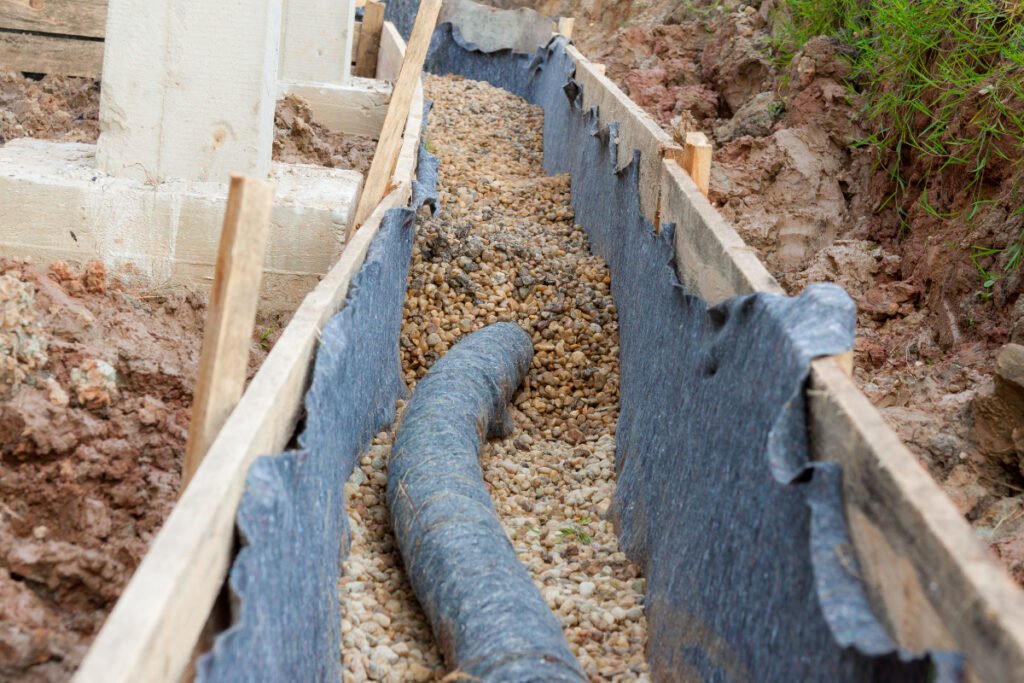
What Is It: A PVC pipe is a thin and flexible polyvinyl chloride or polymer pipe for smaller backyard french drains and rain water dispersion.
PVC pipes are small, white pipes with downward perforations and high tensile strength that resists corrosion and water damage in any exterior french drain. They are affordable, durable, and have a smooth inside that resists clogging and reduces overall maintenance.
Moreover, PVC pipes have different sizes and thicknesses and can be used effectively under patios and driveways. They are also easy to DIY and maintain and have a low breakage rate. Plus, they filter water and are a safe choice if your drains discharge into nearby pools.
However, a PVC pipe bends easily and might not fit into any perimeter or channel drain with many connections. Also, using an inlet grate or drainage fabric is advisable to prevent debris from pressuring the PVC pipe walls.
Best Used For: Smaller french drains under driveways, patios, bog gardens, and decks
| Standard Sizes | 8, 10, 12, 14 inches |
| Average Weight | 12 – 15 pounds per foot |
| Rough Cost | $4 – 6 per foot |
Pros:
- High water drainage and Less likely to clog
- Easier to Install, Clean, and Maintain
- Durable and long-lasting
- Available in various thicknesses and sizes for each use
- High strength and weight retaining capacity
Cons:
- Harder to bend and curve
- Harder to transport and assemble on site
- Prone to root and pest growth
- Time-consuming to plan and join
Pour warm water, baking soda, or enzyme cleaners down the PVC pipe once a week to remove all the excess salt accumulations and maintain high water flow down the drainage system.
2. Corrugated Pipe

What Is It: A corrugated pipe is a solid pipe with iron, steel, or polyethylene gutters and depressions that bend along rigid retaining walls, basements, and foundations.
A corrugated pipe is a grooved drain pipe for easy bending and curvature along the perimeter joints and larger landscaping stone. They are extremely lightweight and have fewer connections that boost the french drain installation speed and stop leakages. They also prevent root infiltration extensively.
However, corrugated pipes are thin; hence, they need proper pea gravel and soil packing to maintain the correct slope and depth. Or, you can use a drainage fabric to protect it further and enhance its durability.
Lastly, you cannot snake these pipes, so use them in paved or decked areas to avoid soil accumulation and clogging.
Best Used For: Paved or concrete decks, patios, and parking lots
| Standard Sizes | 4, 6, 12 inches |
| Average Weight | 16 – 18 pounds per feet |
| Rough Cost | $2 – 8 per foot |
Pros:
- Easier to Install, Turn and Connect
- Fewer connections and Speedy piping installation
- Affordable
- Lightweight and Easy to transport and store
- No glued connections
Cons:
- Might retain the excess water and cause a drainage issue
- Holds sediment and clogs easily
- Low strength and durability
- Varying pipe heights and thicknesses
Corrugated piping has a low weight capacity and might break under the weight of heavier crushed stone or rock. So, using a 1-inch river stone with this one is advisable.
3. Perforated Drain Pipe
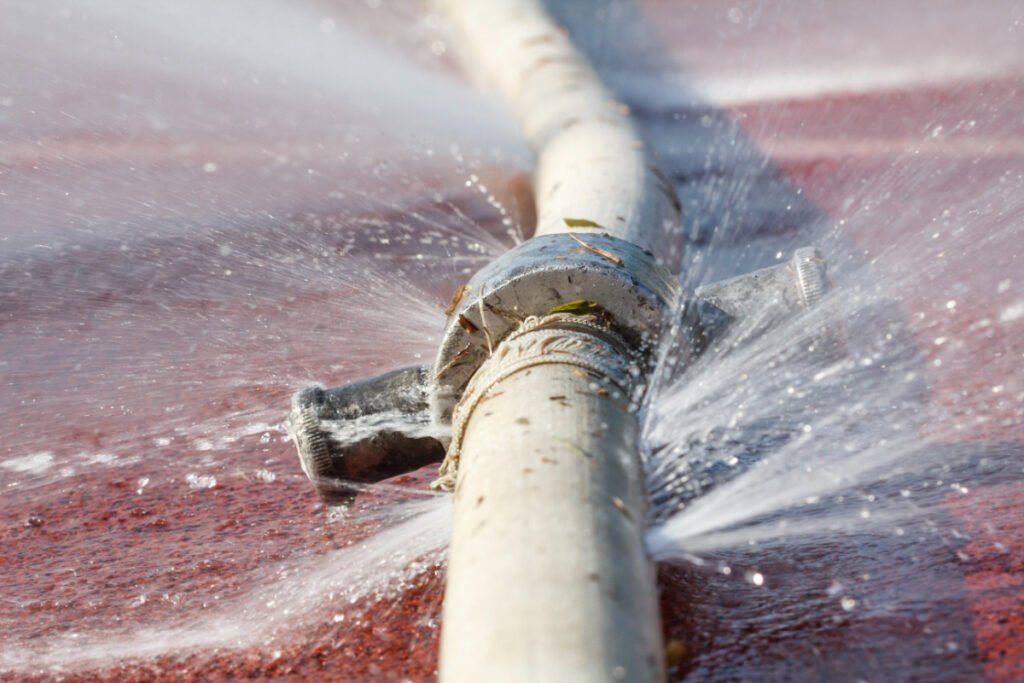
What Is It: A perforated pipe is a simple french drain pipe with evenly spaced slots and holes that allows the excess water to drain into the surrounding soil without hampering the overall drainage speed.
Perforated pipes have holes that prevent excess runoff water from seeping into the ground and causing a drainage problem near the foundations. Thus, they are an effective drainage solution to relieve the extra pressure from your retaining walls, foundations, and basements.
Perforated pipes have fast drainage and aren’t prone to soil clogs, unlike other drainage pipes. But, these might crush under heavier gravel and are best used in shallower drains.
And these are also prone to root infiltration, mosquitoes, and pests. So, don’t commit the common french drain mistake of forgetting a landscape fabric!
Best Used For: Soft scraped garden, Wet basement or perimeter piping
| Standard Sizes | 3, 5, 6, 12 inches |
| Average Weight | 8 – 10 pounds per feet |
| Rough Cost | $4 – 10 per foot |
Pros:
- Collects excess water from all sides in the trench
- Minimizes soil erosion, and water damage
- Filters water on its own
- Affordable and flexible
- Fast drainage and high water flow
Cons:
- Prone to mosquito breeding and pests
- Vulnerable to soil and sediment build-up in high rainfall areas
- Difficult to clean
- Low crushing strength and weight capacity
Always add a 4-inch coarse sand or gravel layer on top of the perforated pipe before including turf or grass for better protection against clogging.
Comparing the Best Pipes for French Drainage System
| Parameter | PVC Pipe | Corrugated Pipe | Perforated Pipe |
| Ease of Breaking | High | High | Moderate |
| Crushing Strength | High | Low | Low |
| Cost | Low | Moderate | Low |
| Durability | High | Moderate | High |
| Water Capacity | High | Moderate | High |
| Pipe Surface | Solid / Perforated | Solid | Perforated |
| Tensile Strength | High | Low | High |
| Weight | Light | Moderate | Light |
Which Pipe Should Not Be Used in a French Drain Trench?
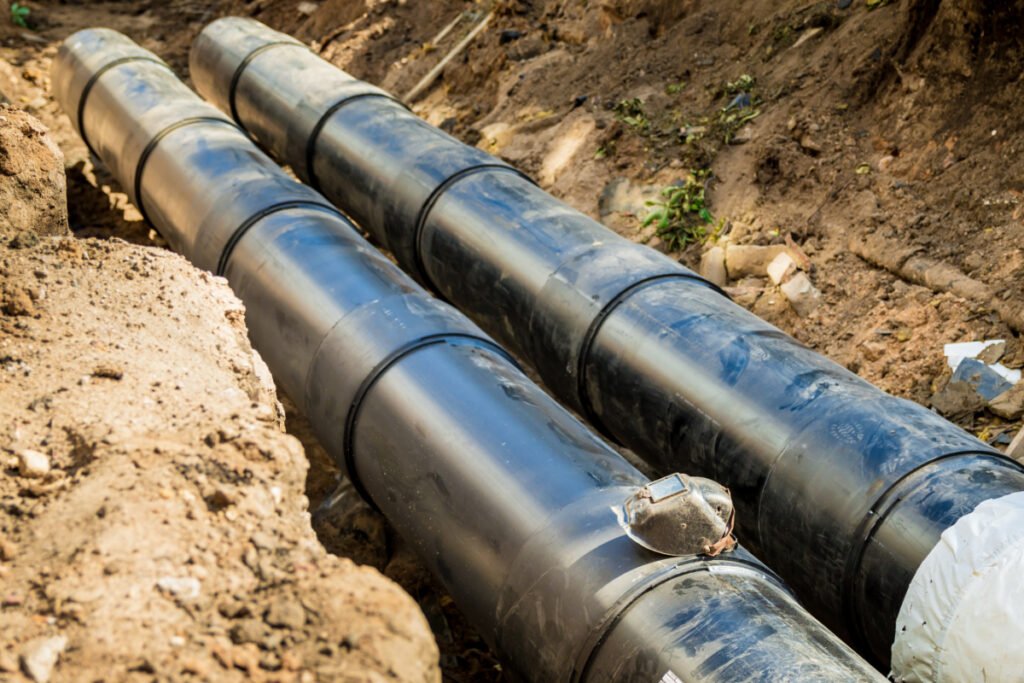
French drains are typically below-ground drainage systems. So, you mustn’t use corrosive piping that breaks off with heavy water flow or gravel. And, some pipes may rust on groundwater exposure or melt due to the sun.
So which pipes should you avoid for a french drain? Let’s find out below.
- Polybutylene Pipe: Polybutylene pipes are brittle and prone to leaks with time. Plus, they cannot handle heavy water runoff and break down under concrete driveways and patios.
- Galvanized Steel Pipe: These pipes rust, corrode and develop a whitish salt layer in 2-3 years and need frequent replacement to maintain the proper drainage speed.
- Lead Pipe: Lead pipes are strong and sturdy but might contaminate the neighboring soil and gravel and cause water pollution in the drainage ditch. They are highly toxic and shouldn’t be used in any residential drainage system.
- Cast-Iron Pipe: Cast iron pipes are prone to mildew and fungi attacks and are pretty noisy for residential use. Plus, they expand and contract with temperature variation and disorient easily.
What Size Pipe Is Best for Drainage?
A 4-6 inch PVC pipe with downward perforations is the best for small backyards, landscapes, and moderate rainfall areas. However, you can pick 8-12 inch pipes for high-rainfall areas or coastal zones and larger, 14-inch pipes for commercial applications.
Which Pipe Is the Easiest to Cut?
Thin-walled and flexible corrugated pipes are the easiest to cut with manual or PEX cutters. But, PVC or perforated metal pipes can also be cut using steel threading machines. Or, you can heat them with a propane torch and then cut them with miter saws for a smooth cut.
Pick manual hacksaws or mitered saws for rough cuts at the pipe connections, but use a threading machine for a smooth cut for easy gluing.
Which Stone Is Best for Drains Under Driveways?
PVC pipes bear the weight of heavier vehicles and pedestrian traffic and prevent groundwater percolation under a driveway. But a perforated pipe prevents flooding along the driveway. So, pick PVC pipes for deeper drains and perforated ones for shallower drains.
Tips to Pick the Best Pipe for a French Drain System:
- Use a larger 12-inch PVC pipe to maintain the water flow in a larger french drain plus catch basin system.
- Add a simple trench drain grate at the mouth of your pipe to filter dirt and debris beforehand. Or, you can use a mesh or sieve for better filtration.
- Use high-strength PVC pipes under driveways, patios, and decks.
- Pick corrugated pipes on compact or irregular sites with many joints and connections.
- Choose perforated pipes to support grass cover or smaller plants in garden drains. Or, you can choose similar trench drains or french drain alternatives for better landscape solutions.
- Pick a solid pipe in areas of frequent flooding and go with perforated pipes in high rainfall areas.
How Much Does It Cost to Install a French Drain Pipe?
Generally, it costs about $10,000 – 18,000 to install french drain pipes along smaller garden drains and backyards. However, the total cost depends upon the labor rate, perimeter applications, and site area and differs accordingly.
How Much Does It Cost to Clean a French Drain Pipe?
French drain cleaning costs about $45 – 150 per hour for regular cleaning and snaking but might cost $450-500 for professional bleaching and root removal.
How Deep Should the French Drain Pipe Be?
French drain pipes must be at least 12 – 18 inches below the ground level and should have a one-inch slope for every 10 feet pipe.
Should I Use Solid or Perforated Drain Pipe?
Pick perforated drain pipes for groundwater drainage in moderate to high rainfall areas, but choose solid pipes in low-lying areas that are prone to flooding. Generally, perforated pipes channel water and disperse the heavy flow evenly, whereas solid pipes discharge it far away and prevent flooding in an area.
Do I Need Gravel for a Solid Pipe?
You do not need gravel along the length of a solid pipe, but you’ll need to place gravel under the pipe to maintain proper slope and pipe depth.
A french drain pipe boosts the surface drainage and water flow in any french drain system. So, the pipe must be sturdy, weather-resistant, and durable enough to withstand the heavy water flow. And different PVC, corrugated and perforated pipes will help you channel your stormwater under paved areas and lawns.
These pipes not only come in various sizes and thicknesses but have flexible connectivity that suits different applications. However, they must be packed with the right gravel for proper slope and water percolation. So, you can check our recommendations on ‘The best rock for a french drain’ and its specifications and sizes for optimal drainage.

